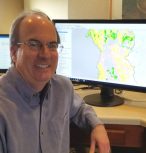DNA reveals the past and future of coral reefs
New DNA techniques are being used to understand how coral reacted to the end of the last ice age in order to better predict how they will cope with current changes to the climate. James Cook Univer

From 2005 to 2022, the main node of the ARC Centre of Excellence for Coral Reef Studies was headquartered at James Cook University in Townsville, Queensland (Australia)








Abstract: Approximately 40% of the world’s and U.S. populations live in coastal regions and these populations are also among the fastest growing. Coastal areas have high exposure to various flooding threats and increasingly, sea-level-rise (SLR). Displacement from SLR will become, in many current residents’ lifetimes, one of the most significant challenges for human society. Society and planners (e.g., conservation, land use, infrastructure, hazards management) in coastal regions will be forced to confront the need for “managed (or planned) retreat” inland. Relocation of communities will compete with existing production areas (e.g., agriculture), natural areas important for biodiversity conservation, and migrating species and coastal ecosystems; raising unprecedented environmental, socioeconomic, and political challenges. Research into solutions has been ongoing for some years, but there is a pressing need to operationalize methods and rapidly make these accessible to thousands of coastal planners and resource managers globally. Over many years I have worked with colleagues at James Cook University, the U.S. National Oceanographic and Atmospheric Agency, and others to develop and apply frameworks for “integrated land-sea planning” (ILSP) that had focused primarily on preventing or reducing delivery of land-based pollutants into marine ecosystems. As threats from flooding and SLR have increased, we have started to integrate these considerations into the ILSP frameworks. This seminar will lay out an ILSP framework, opportunities to address coastal adaptation (including managed retreat), and illustrate a recent set of coastal resilience and prioritization assessments in the U.S. and conclude with a group discussion about issues raised in the seminar.
Biography: Dr. Patrick Crist is a multidisciplinary practitioner at the interface of biodiversity conservation and integration of human needs. He is a thought leader in the development and application of decision support systems for improved assessment and planning. Dr. Crist works collaboratively with a variety of organizations and geographic scales to scope, create, and direct complex projects and initiatives that integrate science and technology to solve real problems. Drawing from his diverse background in landscape architecture, planning, conservation biology, and biogeography, Dr. Crist brings a wealth of experience to solving “wicked problems” in conservation and multi-objective land and sea use and resiliency. He is a frequent contributor to advisory groups serving diverse sectors such as electrical transmission and transportation planning, forestry, green infrastructure, and climate change adaptation. Capacity building is a focus of his work and he is a frequent mentor of students and early-career practitioners.
New DNA techniques are being used to understand how coral reacted to the end of the last ice age in order to better predict how they will cope with current changes to the climate. James Cook Univer
A new study on the effects of climate change in five tropical countries has found fisheries are in more trouble than agriculture, and poor people are in the most danger. Distinguished Profess
James Cook University researchers have found brightly coloured fish are becoming increasingly rare as coral declines, with the phenomenon likely to get worse in the future. Christopher Hemingson, a
Researchers working with stakeholders in the Great Barrier Reef region have come up with ideas on how groups responsible for looking after the reef can operate more effectively when the next bleaching
Abstract: As marine species adapt to climate change, their heat tolerance will likely be under strong selection. Individual variation in heat tolerance and its heritability underpin the potential fo
Abstract: The Reef Ecology Lab in KAUST’s Red Sea Research Center explores many aspects of movement ecology of marine organisms, ranging from adult migrations to intergenerational larval dispersal
Abstract: Macroalgal meadows are a prominent, yet often maligned component of the tropical seascape. Our work at Ningaloo reef in WA demonstrate that canopy forming macroalgae provide habitat for ad
Abstract: Sharks are generally perceived as strong and fearsome animals. With fossils dating back at least 420 million years, sharks are not only majestic top predators but they also outlived dinosa
Abstract: Connectivity plays a vital role in many ecosystems through its effects on fundamental ecological and evolutionary processes. Its consequences for populations and metapopulations have been
Abstract: Evolution of many eukaryotic organisms is affected by interactions with microbes. Microbial symbioses can ultimately reflect host’s diet, habitat range, and even body shape. However, how
Abstract: The past few years have seen unprecedented coral bleaching and mortality on the Great Barrier Reef (GBR) but the consequences of this on biodiversity are not yet known. This talk will expl